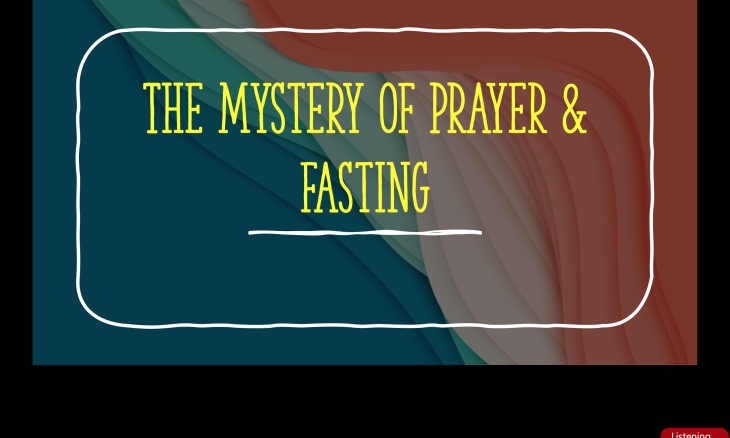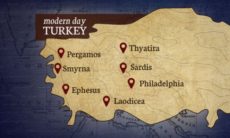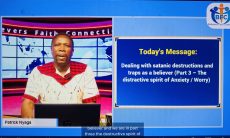What is prayer?
Prayer is communication with God. The Bible says in 1 John 5:15, “This is the confidence we have in approaching God: that if we ask anything according to his will, He hears us.” You can have assurance that if you call on Him, He will answer you.
The four main purposes of prayer Includes:
1. Adoration
Our first and foremost duty is to acknowledge God as a supreme Creator and Father, and His supreme excellence.
Adoration is due to God alone, because He alone is supreme over all. All other beings are creatures, being made by God and ruled by Him.
Adoration is the essential act of prayer because it expresses the creature’s awareness of the Creator. Consecrating ourselves to God is an ideal prayer of adoration.
Psalm 9:1-2 declares, “I will give thanks to the Lord with my whole heart; I will tell of all thy wonderful deeds. I will be glad and exult in thee, I will sing praise to thy name, O Most High”
Psalms 119:164: “Seven times a day I praise thee for thy righteous ordinances”
2. Thanksgiving
We pray to thank God for His favors. God’s purpose in creating the world was not only to give us material goods and security, but also to inspire in us grateful thoughts about Him, so that we might reach our sublime destiny.
Our entire beings are God’s free gifts of love. He has given us immortality so that we can know, love, and possess Him for all eternity.
By His providence, He watches over us day and night with unfailing care and bestows on us many blessings. When we wander away from God through sin, He forgives us through the saving grace of the Sacrament of Penance. When we become hungry and tired in soul, He nourishes us with His own Body and Blood. In our prayers, we can put our gratitude into words for these marvelous gifts.
Ephesians 5:18-20: “But be filled with the Spirit, addressing one another in psalms and hymns and spiritual songs, singing and making melody to the Lord with all your heart, always and for everything giving thanks in the name of our Lord Jesus Christ to God the Father”
Frequently during the day, as we go about our work, we should turn our thoughts and affections to God by offering Him prayers of gratitude.
3. Repentance
Accepting the free gift of eternal life begins with repentance. Repentance is nothing but feeling sorry for committing sin against God our creator. In Acts 3:19 St. Peter says: Repent, then, and turn to God, so that your sins may be wiped out.”
We pray to obtain from God the pardon of our sins and the remission of their punishment. When we break God’s law, we offend God. Sorrow for sin makes for fruitful conversation with God.
4. Petition
In Matthew 7:7, our Lord has urged us to make such appeals: “Ask, and it will be given you; seek, and you will find; knock, and it will be opened to you”
We pray to ask for graces and blessings for ourselves and others. We need God every moment of our lives in the natural order. We depend upon God for everything, and for that reason, we pray to Him for help. We may ask for temporal as well as spiritual favors.
God is the limitless source of all good, and He longs to share this good with us. He has even assured us that our goal is to reign with Him in Heaven and to share His own happiness there forever.
What is fasting?
Fasting is when we go without food (or specific types of food) for a period of time in order to direct our attention more fully to God. It helps us as believers to not be ruled by our physical desires but to grow in spiritual power and authority over the desires of our flesh.
Fasting is a powerful spiritual discipline that aligns our hearts more closely with the heart of God and empowers us to see breakthroughs in specific areas.
Fasting and prayer are often linked together (Luke 2:37; 5:33). Fasting without praying isn’t fasting. It is dieting or deprivation. The only reason to fast is to make space for you to seek the Lord with greater urgency. In other words, fasting gives us more time for prayer and prayer helps tear down walls, utter us into spiritual breakthroughs, destroys chains, and gives us clarity of God’s answers that we seek!
Types of fasts
There are a wide variety of types of fasts, which we’ve simplified into three main categories:
2. Complete Fast
Also known as a full fast, a complete fast is when you do not eat any food (and consume liquids only) for a specific period. Please consult a medical professional in advance if you intend to do a complete fast for a prolonged period especially if you have a condition in your body
2. Partial Fast
A partial fast is when you fast all food for a set specific time throughout the day. For example, you may decide to fast from sunrise to sunset and eat food only in the evenings.
3. Selective Fast (ex. The ‘Daniel Fast’)
A selective fast is when you fast only specific types of foods. The most popular selective fast is known as the Daniel Fast (more details below).
Daniel 9:3-5.
“So I turned to the Lord God and pleaded with him in prayer and petition, in fasting, and in sackcloth and ashes. I prayed to the LORD my God and confessed, “Lord, the great and awesome God, who keeps his covenant of love with those who love him and keep his commandments, we have sinned and done wrong”.
Benefits of prayer and fasting
Fasting is one of the most important disciplines in the Christian faith. It is indeed an open secret because Jesus after being baptized at the Jordan River by John the Baptist and after the dramatic announcement from Heaven by the Holy Spirit that He pleased God, the next thing He did prior to starting His earthly ministry was to engage a 40 day and night period of fasting in the wilderness.
The enemy of our souls does everything in his power to hinder our understanding and the practice of fasting with prayer. Satan knows that we will have spiritual power if we engage the discipline as a congruent part of our spiritual walk. If we are to be successful in the practice of faith and we call ourselves followers of Jesus, we must engage the spiritual discipline of fasting in some form and measure. After Jesus returned to heaven, the early church continued fasting with prayer as a habitual practice.
While I am sure that many more benefits exist for fasting with prayer, here are the top 10 benefits from the scriptures.
- Power to overcome satan and his minions
In Matthew 4:1-11, Jesus put satan in his place when he was tempted in the wilderness for an extended period of time. In verse 11 we read “Then the devil left Him, and behold, angels came and ministered to Him.” Luke writes in Luke 4:13 “Now when the devil had ended every temptation, he departed from Him until an opportune time.” If you want the devil to leave you alone for seasons since he is a pest, the best thing to do is to take up a habitual life of prayer and fasting. When he returns for another bout, you will no doubt be ready.
2. Preparation for the work of God
The Lord Jesus did not begin ministry until after a 40-day fasting period. This is not to say everyone must fast for 40 days to serve God. No! The scriptures are clear with examples of many kinds of fasts. Read Luke 4:1-13
3. Hearing clearly what the will of God is about any matter
God can speak to us at any time regardless of whether we are fasting or not. However, we must remember that we are engaged in spiritual warfare and sometimes the battle is so fierce such that reinforcements are needed. Daniel fasted for 21 days and found out from a visiting angel that a demon prince had resisted him for 21 days. The angel had pertinent information for Daniel. We still read those inspiring prophetic words today.
4. Petitioning Heaven for God’s will to come to pass
We are told in Luke 2:36, that a woman called Hannah even at 84 years served God with fasting and prayer in the temple day and night. This woman with a prophetic anointing came by when baby Jesus was being dedicated in the Temple and the record has it that “coming in that instant she gave thanks to the Lord, and spoke of Him to all those who looked for redemption in Jerusalem.”
5. A Sacrifice to God that delights Him
Paul writes in Romans 12:1 “I beseech you therefore, brethren, by the mercies of God, that you present your bodies a living sacrifice, holy, acceptable to God, which is your reasonable service.” I expand on this concept in an article titled “Fasting as a living sacrifice”
6. Watching in prayer and fasting
When Paul the Apostle was on a ship heading to Rome a tempestuous wind called Euroclydon eventually led to a shipwreck on the Island of Malta. The story of their deliverance from the very difficult situation and several days of darkness and being lost at sea was Divine providence. In the referenced verses Paul spent time fasting with prayer petitioning the Lord of Heaven for the lives on the ship and he heard from Heaven that no lives will be lost. He said “there stood by me this night an Angel of the God to Whom I belong and Whom I serve”
7. For enduring covenants with God
Spiritual fasting is a sacrifice in itself and God says that His saints enter into covenant with Him when they make a sacrifice. God decides the details and terms of the covenant. This spiritual principle applies to any type of sacrifice God asks of us. Read Psalm 50:23. I write a bit more about this in an article titled “Fasting as a living sacrifice”
8. Fasting humbles and changes us
One of the most effective ways to humble yourself is through fasting. There is something about having food that causes us as humans to get carried away. It is interesting that the problem in the garden with Adam and Eve began with food as we read from Genesis 3. Intentional abstinence from the pleasure of one or more meals has a miraculous way of humbling us causing a repentant posture. If your abstinence is not intentional you will get angry quickly at the slightest provocation. In Psalm 35:13 David said, “I humbled my soul with fasting…”
9. The deliverance of a nation
When Hamman tried to destroy the Jews in the Assyrian Kingdom Esther fasted for 3 days along with her maidens. God intervened mightily saving them and destroying their enemies. Read the book of Esther. It is a book where you won’t find the word God mentioned however everything in it screams “God is in control.”
10. Promotes a healthy body
It has been found by medical researchers that fasting even if it did not include prayer (non-spiritual fast) has several health benefits. a non-Christian article on the subject.
Health Benefits of Fasting, Backed by Science
- Promotes blood sugar control by reducing insulin resistance
- Promotes better health by fighting inflammation
- May enhance heart health by improving blood pressure, triglycerides, and cholesterol levels
- May boost brain function and prevent neurodegenerative disorders
- Aids weight loss by limiting calorie intake and boosting metabolism
- Increases growth hormone secretion, which is vital for growth, metabolism, weight loss, and muscle strength
- May aid in cancer prevention and increase the effectiveness of chemotherapy
How to Engage in Fasting & Prayer?
- Engage Continuously
Many believers have given up before the arrival of their blessings. Daniel prayed continually despites the attacks He received against serving His God. He went back inside and threw his window opened and prayed as his custom. No wonder he remains relevant in the reigns of six kingdoms. James 1:25 says, “But whoso looketh into the perfect law of liberty and continueth therein, he being not a forgetful hearer, but a doer of the work, this man shall be blessed in his deeds.”
- Engage fervently
It is the fervency of your input that determines the quantity of your output. “Behold I come quickly my reward are with me to give every man according to his work shall be.” James.1:25. Nothing of value is for free. Until you pay the price via you fervent engagement, rewards are out of view.
- Engage with faith
Anything you do in the kingdom not mixed with faith; it is a waste. Until your engagement is mixed with faith, the mystery cannot produce its potency. “But without faith it is impossible to please him: for he that cometh to God must believe that he is, that he is a rewarder of them that diligently seek him.” Heb.11:6. “And blessed is she that believed: for there shall be a performance of those things which were told her of the lord. ” Lk.1:45
- Engage with expectation
Don’t come to God without expecting something. Many believers run to God without knowing what they want. Your desire must be specific, and must correlate with scriptural prescriptions. “For I know the thought that I think towards you, saith the lord, thoughts of peace and not evil to give you an expected end.” Jer 29:11.
- Engage tirelessly
It is your tireless engagement that produces results. Engage both in season and out of season, both when it is raining and it is sunning. “Although the fig tree shall not blosom, neither shall the fruits be in the vines; the labour of the olive shall fail, and the field shall yield no meat; the flocks shall be cut off in the fold, and there shall be no herds in the stall. Yet I will in the God of my salvation. The lord Is my strength, and he will make my feet like hinds feet and he will make me to walk upon my high places. To the chief singer of my stringed instruments.” Hab.3:17-19
- Engage with praise and thanksgiving
Don’t ever come to God with murmurings, complains and grumblings. God hate Murmurers and grumblers. Philippians 2:14 says, “Do all things without murmurings and disputings.” I Corinthians 10:10; “Neither murmured ye, as some of them also murmured, and were destroyed by the destroyers.”
Conclusion:
Has the Lord been speaking to you about fasting? Are you afraid or just lazy? Maybe knowing what you stand to benefit yourself and God’s Kingdom as a whole will spur you on. Take intentional baby steps and He will meet you where you are. He is indeed faithful.
Download Audio
Download PDF









